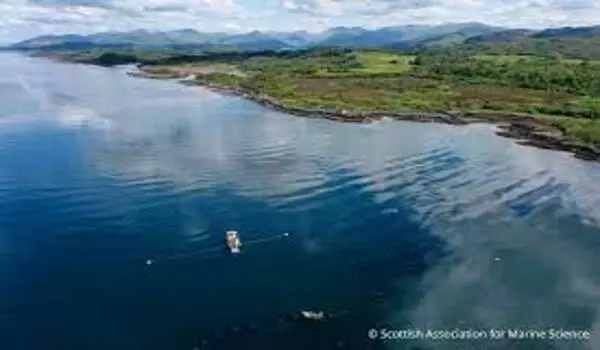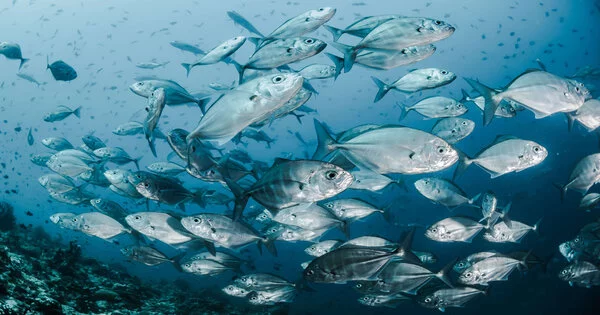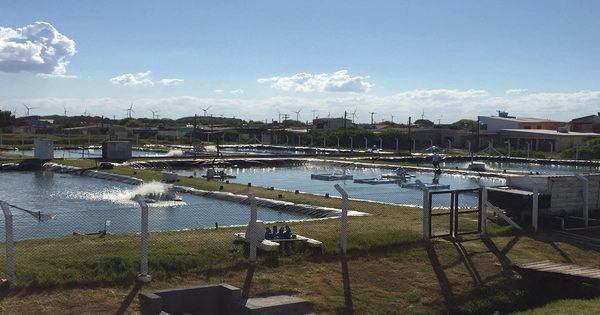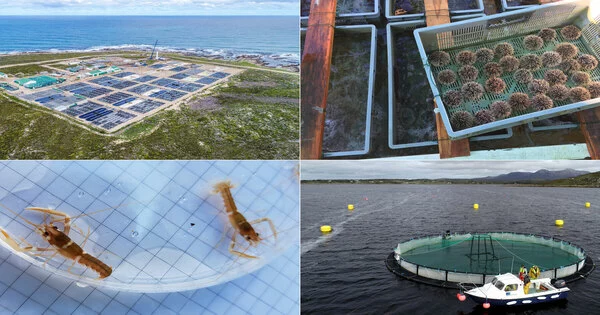We learn that ASTRAL (All Atlantic Ocean Sustainable, ProfiTable, and Resilient Aquaculture) is a collaborative ecosystem for Atlantic aquaculture. ASTRAL (2020–2024) will establish novel, sustainable, and profitable integrated multitrophic aquaculture value chains in the Atlantic region.
The ASTRAL project, which is part of the H2020 Blue Growth programme and is coordinated by NORCE in Norway, contributes to the implementation of the Belém Statement and other trans-Atlantic agreements to develop a strategic partnership on marine research as well as to the development of the All-Atlantic Ocean Research Community.
The project’s major purpose is to build novel, resilient, and profitable value chains to boost the value and sustainability of integrated multi-trophic aquaculture (IMTA) production. Multiple aquatic species from various trophic levels are farmed together in IMTA production. Inputs (fertilizers and food) from one species are used as inputs (fertilizers and food) for another. Four “laboratories” in Scotland, South Africa, Brazil, and Ireland use the IMTA concept to grow fish, scallops, lobsters, oysters, urchins, and seaweed. In Argentina, a potential IMTA lab will be evaluated for future production.

The IMTA Lab Brazil is a Biofloc-based inshore recirculating system. Shrimp Biofloc systems are a sustainable, biosecure alternative to intensive systems since they are hyper-intense and have zero water exchange. During shrimp production, nutrients and organic matter (Biofloc) build up, which must be eliminated mechanically or biologically. To preserve water quality, a combination of organisms that devour organic matter (tilapia and oysters) and nutrients (seaweeds and halophytes) is being used.
IMTA Lab South Africa uses abalone wastewater to cultivate abalone in land-based raceway tanks and Ulva in adjacent interconnected paddle raceways. The Ulva acts as a biofilter, allowing high percentages of water from the Ulva systems to be re-circulated back to the abalone tanks as a supplementary feed, promoting sustainability and circularity. This cost-effective IMTA for sea urchins is also being developed by IMTA Lab SA.
An open-water system, IMTA Lab Scotland, generates macroalgae and shellfish. This system demonstrates how co-cultivation of kelp species and native oysters boosts the economics of this growing system. It also aims to achieve the production scales required to provide broad favorable mitigating impacts, such as by locating salmon farms near sources of anthropogenic nitrogen.
Finfish species are reared in circular plastic enclosures at IMTA Lab Ireland. In an adjacent low-trophic grid system, invertebrates and seaweed are cultivated together. The feasibility of co-cultivating Atlantic salmon, lumpfish, European lobster, native oysters, scallop spp., seaweed spp., and spiny sea urchins is being investigated in this IMTA system. This IMTA system develops, evaluates, and optimizes production technologies for these species. IMTA labs in Ireland follow organic standards in order to maximize potential profits while minimizing environmental effects through sustainability and circularity processes.

The future IMTA Lab Argentina evaluates the progress of the other ASTRAL IMTA labs. To facilitate IMTA, feasibility studies are being conducted to analyze local species and find ideal places inside the Beagle Channel.
ASTRAL’s objectives and project priorities
ASTRAL’s objectives include increasing circularity and achieving zero-waste aquaculture systems. ASTRAL strives to develop a common framework in compliance with the different characteristics of the IMTA setups, given the lack of standardised approaches for assessing circularity in aquaculture. In addition, the project includes an environmental assessment of prospective multitrophic system upgrades from a life cycle viewpoint, as well as the development of relevant business models to boost profitability.
Potential current and future environmental concerns connected to climate change and emerging contaminants (microplastics, hazardous algal blooms, infections) are analyzed in order to ensure the long-term viability of the ASTRAL IMTA-labs. Risks are identified and monitored using dedicated monitoring strategies, which act as an early warning system.

ASTRAL also develops cutting-edge technologies to monitor production and interactions with/from the environment (specific sensors and biosensors, the Internet of Things (IoT), and artificial intelligence (AI) data analytics), with the ultimate goal of providing monitoring recommendations to policymakers and providing cost-effective technical solutions. To construct a collaborative ecosystem around the Atlantic Ocean with industrial partners, small and medium-sized enterprises (SMEs), scientists, policy-makers, social representatives, and other key stakeholders, the ASTRAL project prioritizes knowledge sharing and capacity development. ASTRAL is dedicated to empowering women and raising social awareness about sustainable food production.
The ASTRAL consortium brings together a multidisciplinary group of experts from various sectors, including RTOs, academia, SMEs, industrial clusters, intergovernmental organizations, and other relevant stakeholders from Norway, Scotland, Ireland, France, Spain, Portugal, Nigeria, South Africa, Argentina, and Brazil.
ASTRAL-All Atlantic Ocean aquaculture that is sustainable, professional, and resilient. Norce
is the ASTRAL Coordinator.
ASTRAL Partners and associates: NORCE, AIR Centre, BioceanOR, Buffeljags Abalone, CONICET, Crowdhelix, CSIR, EGM, FURG, LEITAT, M&O Partners, Marine Institute, NIOMR, PMBA, RSA-DFFE, SAMS, TQC, UCT, Viking Aquaculture





